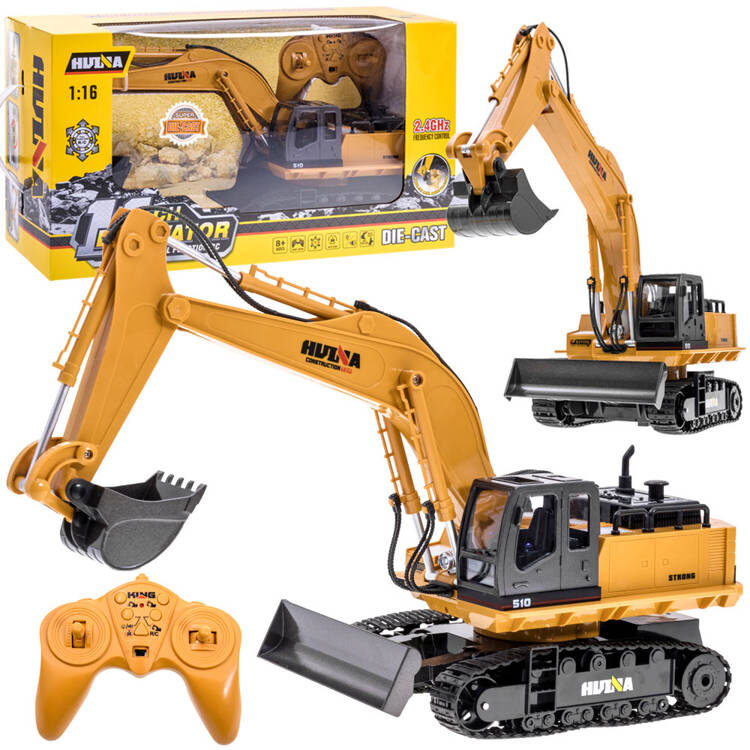Why the Double E Volvo rc excavator Is a Game-Changer for Efficiency and Safety
Understanding Exactly How Excavator Functions and Its Effect On Performance
Excavators play a necessary function in building and construction and mining operations, depending on a complicated interplay of mechanical and hydraulic systems. Their capability to do a selection of jobs hinges on both their layout and the innovation incorporated within. Understanding these components can significantly affect functional effectiveness and efficiency. As improvements continue to reshape the market, one have to think about just how these adjustments will certainly affect future methods and performance.
The Fundamentals of Excavator Mechanics

The Role of Hydraulic Systems in Excavators
At the heart of excavator procedure exists the hydraulic system, which plays a crucial role in powering the machine's functions and motions. This system uses pressurized hydraulic liquid to move power, making it possible for numerous activities such as digging, moving, and training. By taking advantage of the concepts of hydraulics, excavators can do jobs with exceptional precision and force, enhancing overall operational efficiency.The hydraulic system includes crucial elements, including cyndrical tubes, pumps, and shutoffs, which function together to control the flow and direction of the liquid. When the driver engages the controls, the hydraulic liquid is guided to certain cylinders, converting the driver's commands into physical activity. This device enables for responsive and smooth activities, which are necessary in construction and excavation settings. double e volvo rc excavator. The effectiveness of the hydraulic system straight affects the productivity and convenience of the excavator, making it an indispensable component in contemporary excavation procedures
Secret Components of an Excavator
Recognizing the essential components of an excavator is necessary for understanding how this effective machine runs. An excavator contains numerous significant elements, consisting of the undercarriage, house, arm, bucket, and boom. The undercarriage gives stability and movement, usually featuring wheels or tracks to navigate different surfaces. The house has the engine and hydraulic systems, enabling the driver to control motion and power the equipment. The boom extends from the residence, enabling vertical reach, while the arm attaches to the bucket, facilitating digging and training operations.Additionally, the taxicab houses the operator, geared up with controls for specific maneuvering. Each of these components plays a crucial role in the excavator's general performance, adding to its efficiency and efficiency on building websites. Recognizing these parts helps in preserving and maximizing excavator performance, guaranteeing jobs are finished securely and effectively.
Attachment Versatility and Its Benefits
Attachment flexibility is a necessary facet of excavators, making it possible for drivers to switch over in between various devices customized for specific tasks. This adaptability not only enhances job efficiency but also contributes to cost-effectiveness by decreasing the requirement for several devices. Comprehending the various kinds of accessories offered can considerably influence the general performance and performance of an excavator on job sites.
Kinds of Accessories
While excavators are mostly acknowledged for their digging capacities, their real adaptability hinges on the wide selection of add-ons offered. These accessories enhance the excavator's capability, enabling it to do various jobs past excavation. Common accessories include pails (for excavating and scooping), hydraulic thumbs (for comprehending materials), and augers (for piercing openings) Grapples are made use of for moving and handling debris, while rippers can separate tough surface areas. Other specialized add-ons, such as plates and plows, make it possible for excavators to adapt to specific work requirements. This variety not only raises the maker's utility throughout different fields, including landscape design, building, and demolition, yet additionally allows drivers to tailor their devices to meet particular task demands successfully.
Increased Task Efficiency
Making best use of task performance is a primary benefit of making use of different excavator accessories. Various attachments enable an excavator to execute multiple tasks without needing to change tools, saving valuable time and labor. Utilizing a hydraulic hammer can damage concrete while a pail add-on can excavate soil, allowing a smooth operations. This convenience reduces downtime connected with devices adjustments and boosts performance on-site. Additionally, specialized attachments enhance precision in tasks such as grading or landscaping, causing greater top quality end results. The capacity to adjust to numerous job requirements not just streamlines operations but likewise reduces the requirement for additional machinery, guaranteeing that jobs are finished promptly and properly. Overall, attachment flexibility considerably adds to enhanced job efficiency in excavation job.
Cost-Effectiveness and Convenience
Cost-effectiveness is a substantial benefit of using versatile excavator attachments. These attachments allow a solitary excavator to execute numerous jobs, decreasing the need for additional equipment and labor - double e volvo rc excavator. By changing between buckets, hammers, and grapples, drivers can take on different projects, from excavating to demolition, therefore making best use of devices usage. This adaptability not only decreases functional prices however likewise decreases downtime linked with altering devices. Furthermore, the capacity to personalize excavators with specialized accessories enhances efficiency, as they can successfully handle diverse tasks according to project needs. In conclusion, the combination of cost-effectiveness and convenience in excavator attachments contributes rc excavator to boosted functional efficiency and resource allotment in building and construction and excavation jobs

Advanced Technology in Modern Excavators
Modern excavators are significantly geared up with advanced innovation that transforms excavation processes. Automation streamlines procedures, while enhanced gas performance minimizes operational prices. Furthermore, clever control systems enhance precision and safety and security, noting a substantial evolution in excavation devices.
Automation in Excavation Processes
As excavation innovation progresses, automation has emerged as a critical element in improving performance and accuracy on job websites. Modern excavators are outfitted with advanced automated systems that help with tasks such as grading, excavating, and trenching with minimal operator treatment. These systems use sensors, GPS, and equipment knowing formulas to guarantee exact positioning and depth control, significantly reducing the margin for mistake. In addition, automation enables operators to focus on critical decision-making instead than hands-on controls, leading to boosted efficiency overall. Such advancements not only streamline workflows however additionally enhance safety by decreasing human error in complicated operations. Subsequently, the combination of automation in excavation procedures stands for a significant improvement in building and construction innovation, driving the market towards higher effectiveness and effectiveness.
Improved Gas Performance
Improvements in technology have actually additionally caused considerable enhancements in fuel efficiency for modern excavators. Modern machines are geared up with sophisticated engines that maximize power output while reducing fuel usage. These engines make use of innovative combustion innovations, such as turbocharging and direct gas shot, to boost performance and efficiency. In addition, light-weight products in construction reduce total weight, enabling much less energy expense throughout operation. The introduction of variable rate controls enables operators to change engine performance according to certain tasks, additionally reducing fuel use. Therefore, these enhancements not just lower operational costs yet likewise contribute to environmental sustainability by decreasing emissions. Generally, enhanced gas performance in excavators is a vital development that bolsters productivity and economic practicality in the building and construction industry.
Smart Control Solution
While drivers navigate increasingly complicated work websites, clever control systems in excavators have actually emerged as crucial tools for improving effectiveness and precision. These innovative technologies utilize algorithms and sensors to monitor numerous parameters such as load weight, surface conditions, and operational efficiency. By immediately readjusting hydraulic functions, wise systems optimize device efficiency, causing boosted performance and decreased endure elements. Additionally, operators profit from intuitive interfaces that supply real-time feedback and diagnostics, enabling notified decision-making. This assimilation of modern technology not just simplifies operations but additionally decreases human mistake, adding to more secure job environments. As the building industry continues to develop, wise control systems will play an essential role fit the future of excavator effectiveness and efficiency.
Enhancing Functional Performance With Excavators
Excavators play an essential function in boosting functional effectiveness throughout different building and excavation tasks. Their flexibility permits multiple jobs, including digging, product, and training handling, which simplifies process and reduces the demand for additional devices. With effective hydraulic systems, excavators can carry out heavy-duty tasks with precision, considerably reducing the moment called for to total tasks. The integration of advanced modern technology, such as GPS and automated controls, better maximizes their procedure, enabling operators to attain better precision and minimize product waste. Furthermore, contemporary excavators are made to consume less fuel and minimize exhausts, adding to both expense savings and environmental sustainability. By utilizing excavators effectively, building and construction groups can enhance performance, satisfy project target dates, and enhance overall website management. This multifunctionality and performance make excavators crucial tools in the modern construction landscape.
The Future of Excavators in Building And Construction and Mining Industries
As the building and mining sectors advance, the future of excavators is positioned for considerable change driven by technological technology and transforming operational needs. Developments in automation and expert system are improving excavator abilities, permitting enhanced accuracy and effectiveness in operations. Independent excavators are emerging, reducing the requirement for human treatment and reducing the risk of accidents.Moreover, the assimilation of telematics and IoT innovation enables real-time surveillance of maker performance and anticipating maintenance, maximizing uptime. Environment-friendly layouts, including electric and hybrid versions, are acquiring grip, lining up with sustainability objectives within the industry.Additionally, making use of innovative materials and lighter layouts improves gas efficiency while maintaining performance criteria. As these fads progress, excavators will play a crucial role in satisfying the increasing demands for productivity and security in building and construction and mining, inevitably changing operational landscapes.
Often Asked Questions
Just How Do Weather Conditions Impact Excavator Performance?

Climate condition greatly influence excavator performance, as rain and mud can hinder traction and stability, while extreme temperatures may impact hydraulic systems. Operators should adapt to these variables to assure suitable functionality and safety during operations.
What Safety Measures Should Operators Comply With While Utilizing Excavators?
Precaution for excavator operators consist of wearing appropriate personal safety devices, performing pre-operation evaluations, guaranteeing correct interaction with ground employees, keeping a safe range from overhead threats, and adhering to recognized operational protocols to avoid accidents.
Just How Typically Should Excavators Be Kept for Optimal Efficiency?
Excavators need to be preserved routinely to ensure peak performance, commonly every 250 operating hours or as defined by the producer. Routine checks boost reliability, stop unexpected break downs, and expand the life expectancy of the devices.
What Is the Average Life-span of an Excavator?
The typical lifespan of an excavator commonly varies from 10,000 to 15,000 hours of operation. Aspects influencing durability consist of upkeep practices, running problems, and the quality of the maker itself, influencing total performance and effectiveness.

Can Excavators Run on Unequal Terrain Successfully?
Excavators can operate successfully on uneven terrain as a result of their articulated styles and flexible tracks. These functions permit them to maintain stability and grip, enabling effective procedure in difficult settings commonly come across in building and construction and landscaping jobs. Each of these parts plays an important role in the excavator's total functionality, contributing to its effectiveness and performance on construction websites. Optimizing work efficiency is a main advantage of using numerous excavator attachments. While operators navigate progressively complicated work websites, clever control systems in excavators have actually emerged as necessary devices for enhancing efficiency and precision. Excavators play a vital duty in boosting functional performance throughout numerous construction and excavation tasks. Breakthroughs in automation and artificial intelligence are improving excavator abilities, enabling for enhanced precision and performance in operations.